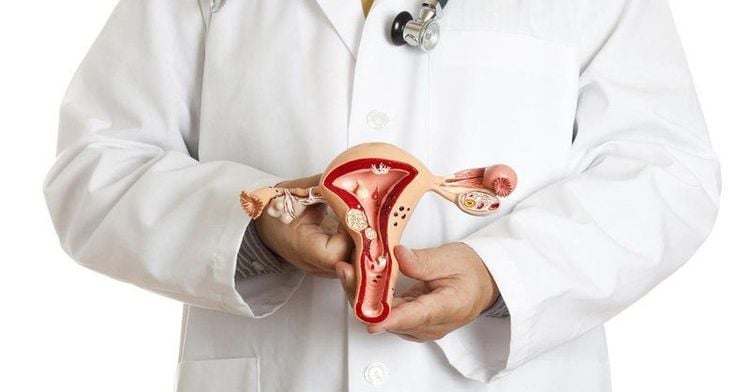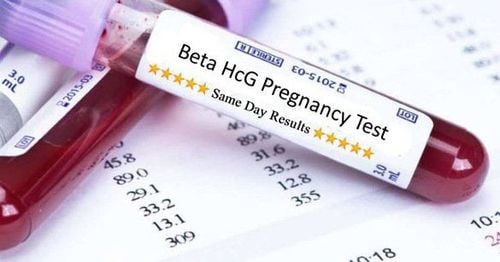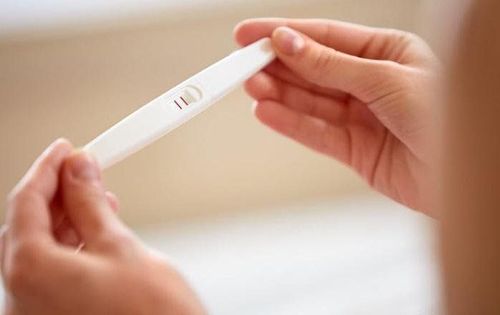This is an automatically translated article.
The article was professionally consulted by Specialist Doctor II Pham Thi Tuyet Mai - Obstetrician and Gynecologist - Department of Obstetrics and Gynecology - Vinmec Hai Phong International General Hospital.What a mother needs to do after a miscarriage is to ensure her health, keep herself as comfortable as possible, which will be favorable for the development of the fetus in the next pregnancy and especially will limit the possibility of miscarriage.
1. What is a miscarriage?
According to the World Health Organization (WHO), a miscarriage is a condition in which a fetus is expelled from the uterus before 20 weeks of amenorrhea or when the weight of the fetus is less than 500g, when the fetus is not viable.2. Risk factors for miscarriage
2.1 Maternal factors Inflammation in the genital organs can lead to miscarriage, but the rate of infection causing miscarriage is not high. Systemic infections such as flu, malaria, pneumonia... that cause high fever are also causes of miscarriage. Hormonal factors Mothers with hypothyroidism often lead to miscarriages, due to deficiency of thyroid hormone thyroid hormone causes immune disorders Diabetes: Seen in mothers with type 2 diabetes, the risk of miscarriage depends on glycemic control during pregnancy. Nutrition provides inadequate nutrients, vomiting a lot leading to weight loss can also cause miscarriage. However, such cases are very rare. Active or passive smoking increases the risk of miscarriage. Alcoholic mothers cause miscarriages and birth defects. Drinking 5 cups of coffee a day also increases the risk of miscarriage. Immune-related factors: Anti-phospholipid antibodies, anti-trophoblastic antibodies... Abdominal surgery: If minor surgery does not affect pregnancy. including surgical removal of ovarian tumors. However, it should be noted that in the case of corpus luteum cyst (the luteal ovum remaining after ovulation) has the effect of secreting the hormone progesterone, so if surgery is performed between 8 and 10 weeks, it is necessary to inject an additional dose of the following hormone. surgery. If it is earlier than 6-8 weeks, 2 doses should be given 1 to 2 weeks apart. Toxic working environment, lead, mercury, arsenic poisoning Direct or indirect trauma to the abdomen during pregnancy, emotional trauma, etc. Abnormal uterus Abnormalities due to acquired such as : Large uterine fibroids, many uterine fibroids, the location of uterine fibroids are detrimental to the development of the fetus. Adhesions to the uterus due to damage after curettage or abortion, making the remaining endometrium not enough to nourish the fetus. Congenital uterine malformations: Double uterus, bicornuate uterus... often miscarriage late or cause premature birth
3. Types of Miscarriage
There are many different types of miscarriage, the symptoms and treatment of each case are not the same.3.1 Threatened miscarriage Is a condition where the symptoms are similar to a miscarriage, but the pregnancy has not been removed, the cervix has not been dilated. If treatment can save the pregnancy. There are symptoms such as vaginal bleeding, lower abdominal pain, sometimes pelvic discomfort. About 50% of cases of threatened miscarriage lead to miscarriage, if there is fetal heart activity, the prognosis is better.

3.3 Incomplete miscarriage Common in people who have symptoms of threatened miscarriage before, then develop abdominal pain, more bleeding. Seeing a part of the fetus ejected from the vagina, then continued bleeding and abdominal pain.
Some cases may have a fever due to an infection.
3.4 Early miscarriage Pregnant women appear bleeding, abdominal pain like a period. Miscarriage happens naturally.
3.5 Infective miscarriage Miscarriage accompanied by uterine infection, then endometrium, more severe peritonitis can cause sepsis, endocarditis. If not treated early, it can affect the life of pregnant women.
4. How to diagnose and handle miscarriage
4.1 Diagnosis of miscarriage Women of childbearing age, missed period, positive pregnancy test or increased beta HCG have signs such as vaginal bleeding, abdominal pain from dull to severe pain, may be accompanied by by fever.
Vaginal examination reveals a closed cervix in threatened miscarriage or an open cervix in other cases. Ultrasound detects partial placental abruption, which may still show fetal heart in case of threatened miscarriage. In other cases, fluid was found in the uterine cavity, and the fetus was pushed out of the hole in the cervix. 4.2 Handling clinical cases Threatened miscarriage: For pregnant women to rest in bed, drugs can be used to reduce uterine contractions and limit labor and intercourse for at least 2 weeks after bleeding stops. In other cases, there are many different methods such as: waiting for spontaneous miscarriage, placing pills or aborting the pregnancy (abortion is the fastest solution with almost 100% success, but the technique must be careful to avoid injury. Uterine chambers) Miscarriage that is unavoidable, incomplete miscarriage: You can let the spontaneous miscarriage not interfere, or take mifepristone 400mg, a drug that increases uterine contractions and pushes the pregnancy out of the multiple pregnancy after a few days. . However, if there is still persistent abdominal pain, prolonged bleeding, possibly accompanied by fever, the uterus must be removed and combined with antibiotics. Infective miscarriage: Early removal of the fetus combined with the use of antibiotics to fight infections. Miscarriage is a complication that no mother wants, so early recognition of the signs and risks of miscarriage is something that pregnant women should know to prevent and coordinate with their doctor to come up with a treatment plan. In the case of having to handle pregnancy, there will be a scientific way to handle each type of miscarriage, minimizing the risk to the mother. If you have unusual symptoms, you should be examined and consulted with a specialist.
Please dial HOTLINE for more information or register for an appointment HERE. Download MyVinmec app to make appointments faster and to manage your bookings easily.














